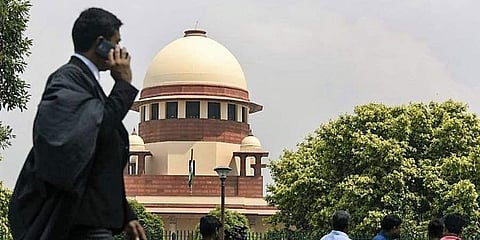

NEW DELHI: There cannot be any "cut-and-dried formula" or "theorem" that gives an answer whether a Constitution amendment violates the basic structure, Supreme Court judge Justice Dinesh Maheswari said while upholding the EWS quota.
The top court in a 3:2 majority decision upheld the 10 per cent reservation for economically weaker sections (EWS) in admissions and government jobs that excluded the poor among the Scheduled Castes (SC), Scheduled Tribes (ST) and Other Backward Classes (OBCs) categories.
Justice Maheswari, who along with justices Bela M Trivedi and J B Pardiwala upheld the 103rd Constitution amendment, said, "It is beyond doubt that using the doctrine of basic structure as a sword against the amendment in question and thereby to stultify the State's effort to do economic justice as ordained by the Preamble and DPSP and, inter alia, enshrined in Articles 38, 39 and 46, cannot be countenanced".
Achieving "social, economic and political justice" is the real and substantive equality, he said in his 155-page judgment.
"This process of striking at inequalities, by its very nature, calls for reasonable classifications so that equals are treated equally while unequals are treated differently and as per their requirements," the judge said.
The top court heard as many as 40 petitions and most of the pleas, including the lead one filed by 'Janhit Abhiyan' in 2019, challenging the validity of the Constitution Amendment (103rd) Act, 2019.
While justices Maheshwari, Trivedi and Pardiwala upheld the law, Justice S Ravindra Bhat along with Chief Justice U U Lalit shot down the same in their minority view.
The judges, part of a five-judge constitution bench, read four separate judgments for over 35 minutes in the courtroom.
Elaborately dealing with the submissions raised in pleas, he said affirmative action in the form of "reservation" is an exception to the general rule of equality.
Justice Maheswari said, "In the multifaceted social structure, ensuring substantive and real equality, perforce, calls for consistent efforts to remove inequalities, wherever existing and in whatever form existing. Hence, the State is tasked with affirmative action".
"And, one duly recognised form of affirmative action is by way of compensatory discrimination, which has the preliminary goal of curbing discrimination and the ultimate goal of its eradication so as to reach the destination of real and substantive equality. This has led to what is known as the reservation and quota system in State activities," he said.
Dealing with economic disabilities and affirmative state action, Justice Maheswari referred to constitutional schemes and said in almost all references to real and substantive equality, the concept of economic justice has acquired equal focus alongside the principles of social justice.
"If an egalitarian socio-economic order is the goal so as to make the social and economic rights a meaningful reality, which indeed is the goal of our Constitution, the deprivations arising from economic disadvantages, including those of discrimination and exclusion, need to be addressed to by the State; and for that matter, every affirmative action has the sanction of our Constitution," he said.
Justice Maheswari also dealt with the issue of whether economic criteria can be the sole basis for grant of quota and if it violated the basic structure doctrine.
"the observations of this court in the past decisions that reservations cannot be claimed only on the economic criteria, apply only to class or classes covered by or seeking coverage under Articles 15(4) and/or 15(5) and/or 16(4) (quota for SCs/STs and OBCs); and else, this court has not put a blanket ban on providing reservation for other sections who are disadvantaged due to economic conditions," he said.
Justice Maheswari also dealt with the major issue of discord that the exclusion of EWS of SC, ST and OBCs from the quota benefit violated the basic framework of the Constitution.
The exclusion of other groups and classes from the 10 per cent reservation earmarked for EWS does not make them constitutionally aggrieved parties to invoke the general doctrine of equality for assailing the amendment in question, he said.
"In other words, their grievance cannot be said to be a legal grievance so as to be agitated before the Court," the judge said.
He also rejected the vehement submission that the EWS quota was invalid on the ground that it exceeded the ceiling limit of 50 per cent laid down in the Mandal commission and other judgments.
"Moreover, as noticed, this ceiling limit, though held attached to the constitutional requirements, has not been held to be inflexible and inviolable for all times to come. ," Justice Maheswari said.
Reasons for this are not far to seek.
As mentioned hereinbefore, reservation by affirmative action is not having trappings of any such essential feature of the Constitution, collectively enumerated by Kesavananda and successive decisions, that its modulation with reference to any particular compelling reason or requirement could damage the basic structure of the Constitution.
Justice Maheswari, in his conclusion, said, "Reservation is an instrument of affirmative action by the State so as to ensure all-inclusive march towards the goals of an egalitarian society while counteracting inequalities."
"It is an instrument not only for inclusion of socially and educationally backward classes to the mainstream of society but, also for inclusion of any class or section so disadvantaged as to be answering the description of a weaker section," he said.
In this background, reservation structured singularly on economic criteria does not violate any essential feature of the Constitution and does not cause any damage to its basic structure, Justice Maheswari held.